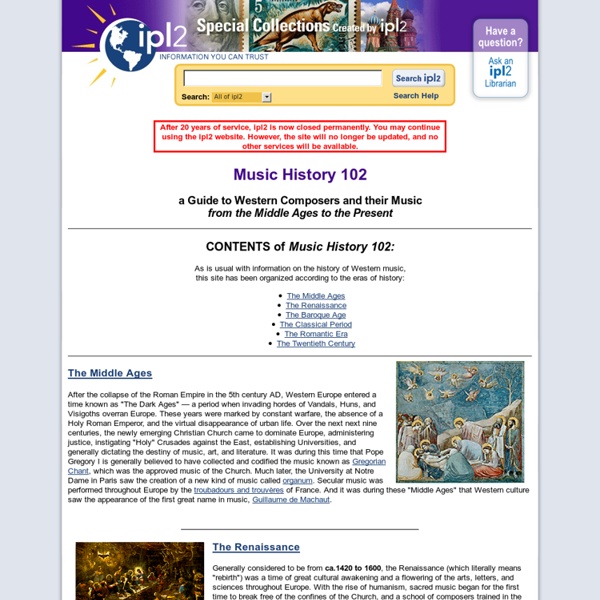Music History 102
a Guide to Western Composers and their Music from the Middle Ages to the Present CONTENTS of Music History 102: As is usual with information on the history of Western music, this site has been organized according to the eras of history: The Middle Ages After the collapse of the Roman Empire in the 5th century AD, Western Europe entered a time known as "The Dark Ages" — a period when invading hordes of Vandals, Huns, and Visigoths overran Europe. The Renaissance Generally considered to be from ca.1420 to 1600, the Renaissance (which literally means "rebirth") was a time of great cultural awakening and a flowering of the arts, letters, and sciences throughout Europe. The Baroque Age Named after the popular ornate architectural style of the time, the Baroque period (ca.1600 to 1750) saw composers beginning to rebel against the styles that were prevalent during the High Renaissance. The Classical Period The Romantic Era The Twentieth-Century
Music Files - free downloads: Sheet Music, MIDI, MP3, Classical, Traditional, Film
15 Free Music Activities and Lesson Plans for the Classroom | Resources for Music Education
The web is a great place to find free music activities and lesson plans that can be used in the classroom. Here are 15 sites that provide helpful materials for teachers. Music Quizzes – The Music Tech Teacher provides more than 130 music quizzes and games that can be used in the classroom. Sound Piper – Sound Piper offers a unique page with a wide range of music classroom activities to teach basic elements of music. The Music Rack – The Music Rack provides free sheet music downloads, staff paper, and other music teacher resources. Levy Sheet Music Collection – The Lester S. Musicards – Musicards are online music theory flashcards. eMusicTheory.com – This site hosts a number of different materials that can only be accessed by members. Flash Music Games – This no-frills site offers a wide range of online flash music games for teachers and students. JamStudio.com Education Program – JamStudio.com offers a fantastic education program for schools.
Music Practice Tips, Guidelines, Strategies, Overcome Stage Fright, Build a Career - The Musician's Way Blog by Gerald Klickstein
Gerald KlicksteinSeptember 21, 2014creative process, creativity, music practice Tags: creative process, creativity, deep practice, deliberate practice, divergent thinking, how to practice music, motivation, music practice, practicing music, problem-solving, The Musician's Way “Making the simple complicated is commonplace; making the complicated simple, awesomely simple, that’s creativity.” -Charles Mingus, bassist (The Musician’s Way, p. 55) Musical problem-solving requires creative thinking, yet the style of thinking that’s commonly taught in schools may not serve our needs in the practice room. That is, a subject such as basic math nurtures convergent thinking that zeroes in on single solutions.
Related:
Related:



